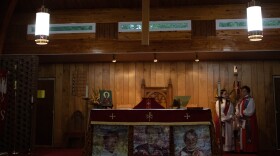On Fridays we've been listening to a series produced by young people involved in WUNC's first ever Summer Youth Radio Institute. This week 15-year-old Akib Khan tells the story of his sister, who decided to start wearing the hijab, the traditional Islamic headscarf, when the family immigrated to the United States from Bangladesh. As our youth reporter tells us it's a decision that was met with some skepticism.
Akib Khan: My sister, Nawsheen, never wore a hijab back in Bangladesh, but she walked into Richmond Senior High School in Rockingham, North Carolina on the first day of her junior year with a bright green headscarf to match her school uniform.
Nawsheen Khan: My first day of high school wearing the Hijab, I did not feel really bad or anything, I felt like I was doing something I wanted to do, I felt like I was representing my community, I felt like I was fighting negative stereotypes. There were some questions, and I was happy to answer those, for the first day, then slowly I was getting tired of those.
Akib Khan: Nawsheen had to learn how to wear hijab on her own. See, our Mom wear’s a shawl, it’s a scarf that draps loosely over a woman’s head. So when Nawsheen decided to wear hijab, like many American teenagers looking for help, she turned to you-tube.
Akib Khan: Her decision to wear hijab was tested when we went back to Bangladesh for a wedding. The ceremony was traditional, the music, food, clothing but none of the young women wore hijab.
Nawsheen Khan: All my friends were like "oh know why did you start wearing it we have a wedding to go to, please dont wear it" none of them were wearing it.
Akib Khan: It wasn't just her friends who told Nawsheen to remove her hijab for the wedding. Our mom, who speaks bengali; also felt that the Hijab would be out of place.
Khohinoor Begum: I did tell her to take off the Hijab at the wedding. She wasn't sure on what to do. Besides it was a family environment and I did not see any problem that could harm her taking off the Hijab for just a couple of hours. Even though she took it off, she was aware, she was conservative, and kept her distance; but it was easier for her to fit in and enjoy the wedding with the Hijab off.
Akib Khan: But instead of letting loose to enjoy the wedding, Nawsheen felt uncomfortable.
Nawsheen Khan: The day I took it off, I hated it, I felt naked, I did not like not wearing it. I also kinda realized after being in America that I was developing an Identity that's not just Bangladesh, I am kinda developing an American identity as well.
Akib Khan: When she got back to the US, she started wearing the hijab again, she says its part of her American identity. Our mom now agrees it’s the right choice.
Khohinoor Begum: Yes, I am very happy that my daughter wears the Hijab. I know that the Hijab will help her stay in the right path and help her to make good decisions.
Akib Khan: Still, Nawsheen's choice to wear a headscarf has made some things difficult for her. She once got into an argument with our dad before getting a passport photo. Dad inisted that she take off her hijab for a few moments just for the picture. He was worried it could make her a target for discrimination in the United States. But my sister resisted.
Nawsheen Khan: And I was like there is no way I am going to take it off. I started crying and I was like this is something I have been trying to establish, trying to fight the negative stereotypes, trying to build an American identity, and even in my own home, even my dad doesn't feel secured about me wearing the hijab.
Akib Khan: Nawsheen is far from the only young, Muslim woman from South Asia to start wearing the Hijab after moving to the U.S. Miriam Cooke, Professor of Arabic & Arab culture at Duke University, explains that often times the action of wearing the Hijab for young Muslim women helps them connect to a new country and culture.
Miriam Cooke: It’s sort of like when students come to University and then suddenly they learn outside the home who they are, what their identities are, and they become interested in finding out more about this identity & in adopting it and projecting it to the world.
Akib Khan: Nawsheen is proud and committed to wearing the hijab, despite struggles and frustrations that come along with wearing the headscarf in this country. For her, it is a way to strengthen her faith, and to form relationships and bonds with other hijabis and her connection to her country.
Nawsheen Khan: Now I see Hijab as being part of my ... part of being American I say. I am an American hijabi.
Nawsheen Khan: Being an American doesn't have to be about your clothes, it’s something, it’s about values, it’s about what you have, you know the values that you have inside.
Akib Khan: My sister graduated from UNC-Chapel Hill last Spring. We were all there, Mom, Dad, my three brothers and, of course, Nawsheen. She was out there in that sea of students in their Carolina Blue graduation gowns. She too was in blue right down to the Carolina Blue hijab she proudly wore underneath her graduation cap.
Akib Khan: For North Carolina Public Radio and the WUNC Summer Youth Radio Institute, I'm Akib Khan.






